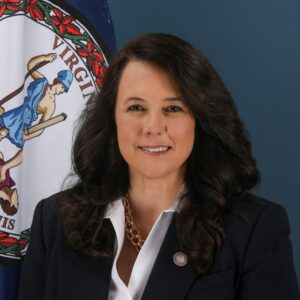
Susan Beals, Commissioner,
Va. Dept. of Elections
by Dick Hall-Sizemore
Governor Youngkin talks a lot about election integrity. By that, he obviously means keeping people ineligible to vote from voting. However, integrity cuts another way, as well. It means allowing people who are eligible to vote the opportunity to vote.
The governor’s Department of Elections (Elections) seems not to worry too much about that second aspect of election integrity. Last fall, due to a computer glitch, the agency discovered that it had not processed thousands of new voter registrations completed by the Department of Motor Vehicles and had to scramble to notify local registrars of the eligibility of those folks as early voting was underway. This year, it is another group of registered voters who have been disenfranchised.
As discovered and reported by VPM, the public broadcasting station in Richmond, an unknown number of folks who have been convicted of felonies, but whose right to vote had been restored by a governor, have been notified that they are no longer qualified to vote because of a conviction of a new felony. However, they were not convicted of a new felony. Instead, they had committed a probation violation. A probation violation is not a felony. In many cases, the specific act that constitutes a probation violation is not even a crime. For example, if a probationer misses a meeting with his probation officer or fails to attend treatment sessions, those are probation violations. When Elections’ cancellation of an individual’s registration due to probation violations was challenged in court, a judge overturned the agency.
The problem arose from the practice of the Department of State Police (DSP) to record a probation violation by a former felon as a felony in the Central Criminal Records Exchange (CCRE). That probably makes sense for the judicial system because probation violations could count against an individual in a future criminal trial. However, it is not appropriate for the purposes of registration eligibility.
Last year, Elections updated its computer code so as to identify persons who had had their rights restored and had subsequently committed a new felony. In December, it triumphantly announced that it had identified 10,558 such individuals. In its haste to identify folks who were no longer eligible to vote, the agency committed a basic error in computer programming. It did not thoroughly familiarize itself with its data. If it had done so, it would have realized that some of those new “felonies” were actually probation violations.
Although a court had ruled in July that probation violations “are not new convictions of felonious crimes disqualifying Petitioner from registering to vote,” Susan Beals, the Commissioner of Elections was still claiming in September that her agency “strictly follows” state law. After VPM issued its initial report and State Senator Scott Surovell (D-Fairfax) got involved, the agency announced on Oct. 3 that it was working with the DSP to identify those individuals whose registration “was canceled in error.”
DSP is changing what information it is sending to Elections. “At the request of the Virginia Department of Elections, and after consulting with the Office of the Attorney General, the monthly [Virginia Central Criminal Records Exchange] report no longer contains felony probation violation charges to not inadvertently disqualify individuals whose rights were previously restored by the former Governor,” a spokesman said.
There has been no indication that there was a deliberate effort to unlawfully cancel people’s registrations, nor have accusations been made in this regard. However, as Sen. Surovell noted, this issue was part of a pattern of mistakes being made by Elections. “These are the kinds of things that you should game out before you make changes to systems like this that affects people’s constitutional rights,” he said.
These problems with not recording or canceling legitimate voter registrations may not have been deliberate, but they do speak to the level of competence in the Department of Elections.


